| Listing 1 - 10 of 10 |
Sort by
|
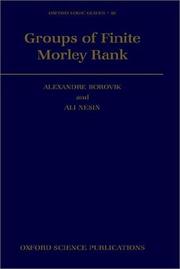
ISBN: 0198534450 9780198534457 Year: 1994 Volume: 26 Publisher: Oxford : Clarendon Press,
Abstract | Keywords | Export | Availability | Bookmark
 Loading...
Loading...Choose an application
- Reference Manager
- EndNote
- RefWorks (Direct export to RefWorks)
This book clearly details the theory of groups of finite Morley rank--groups which arise in model theory and generalize the concept of algebraic groups over algebraically closed fields. Written especially for pure group theorists and graduate students embarking on research on the subject, the book develops the theory from the beginning and contains an algebraic and self-evident rather than a model-theoretic point of view. All necessary model and group theoretical notions are explained at length. Containing nearly all of the known results in the subject, the book offers a plethora of exercises and examples, making it ideal for both students and researchers in group theory and model theory.
Model theory --- Finite groups --- Finite groups. --- Model theory. --- Logique mathématique --- Logic, Symbolic and mathematical --- Groupes, Théorie des. --- Group theory. --- Groupes, Théorie des --- Group theory --- Groupes, Théorie des.
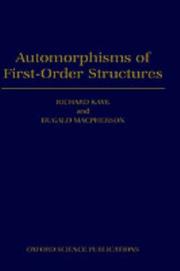
ISBN: 019853468X 9780198534686 Year: 1994 Publisher: Oxford : Clarendon Press,
Abstract | Keywords | Export | Availability | Bookmark
 Loading...
Loading...Choose an application
- Reference Manager
- EndNote
- RefWorks (Direct export to RefWorks)
Model theory. --- Permutation groups. --- Automorphisms. --- Model theory --- Théorie des modèles --- Groupes de permutations --- Automorphismes --- Permutation groups --- Automorphisms --- Groupes, Théorie des --- Group theory --- Groupes, Théorie des. --- Groupes, Théorie des --- Logique mathématique --- Analyse combinatoire
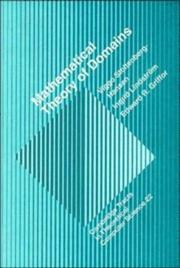
ISBN: 0521383447 9780521383448 Year: 1994 Volume: 22 Publisher: Cambridge : Cambridge University Press,
Abstract | Keywords | Export | Availability | Bookmark
 Loading...
Loading...Choose an application
- Reference Manager
- EndNote
- RefWorks (Direct export to RefWorks)
Computer science --- Approximation theory --- Numerical analysis --- Mathematics --- 510.5 --- -Approximation theory --- 681.3*F41 --- Mathematical analysis --- Theory of approximation --- Functional analysis --- Functions --- Polynomials --- Chebyshev systems --- Informatics --- Science --- Algorithms. Computable functions --- Mathematical logic: computability theory; computational logic; lambda calculus; logic programming; mechanical theorem proving; model theory; proof theory;recursive function theory--See also {681.3*F11}; {681.3*I22}; {681.3*I23} --- 681.3*F41 Mathematical logic: computability theory; computational logic; lambda calculus; logic programming; mechanical theorem proving; model theory; proof theory;recursive function theory--See also {681.3*F11}; {681.3*I22}; {681.3*I23} --- 510.5 Algorithms. Computable functions --- Computer mathematics --- Discrete mathematics --- Electronic data processing --- Informatique --- Ensembles ordonnés --- Computer science - Mathematics
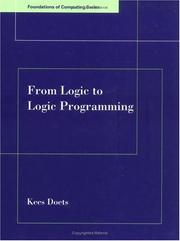
ISBN: 0262041421 9780262288477 9780262041423 0262288478 Year: 1994 Publisher: Massachusetts Institute of Technology (MIT),
Abstract | Keywords | Export | Availability | Bookmark
 Loading...
Loading...Choose an application
- Reference Manager
- EndNote
- RefWorks (Direct export to RefWorks)
This mathematically oriented introduction to the theory of logic programming presents a systematic exposition of the resolution method for propositional, first-order, and Horn- clause logics, together with an analysis of the semantic aspects of the method. It is through the inference rule of resolution that both proofs and computations can be manipulated on computers, and this book contains elegant versions and proofs of the fundamental theorems and lemmas in the proof theory of logic programming. Advanced topics such as recursive complexity and negation as failure and its semantics are covered, and streamlined setups for SLD- and SLDNF-resolution are described. No other book treats this material in such detail and with such sophistication. Doets provides a novel approach to resolution that is applied to the first-order case and the case of (positive) logic programs. In contrast to the usual approach, the concept of a resolvent is defined nonconstructively, without recourse to the concept of unification, allowing the soundness and completeness proofs to be carried out in a more economic way. Other new material includes computability results dealing with analytical hierarchy, results on infinite derivations and an exposition on general logic programs using 3-valued logic.
Logic programming --- Programmation logique --- 681.3*F41 --- 681.3*I23 --- Computer programming --- Mathematical logic: computability theory; computational logic; lambda calculus; logic programming; mechanical theorem proving; model theory; proof theory;recursive function theory--See also {681.3*F11}; {681.3*I22}; {681.3*I23} --- Deduction and theorem proving: answer/reason extraction; reasoning; resolution; metatheory; mathematical induction; logic programming (Artificial intelligence) --- Logic programming. --- 681.3*I23 Deduction and theorem proving: answer/reason extraction; reasoning; resolution; metatheory; mathematical induction; logic programming (Artificial intelligence) --- 681.3*F41 Mathematical logic: computability theory; computational logic; lambda calculus; logic programming; mechanical theorem proving; model theory; proof theory;recursive function theory--See also {681.3*F11}; {681.3*I22}; {681.3*I23} --- COMPUTER SCIENCE/Artificial Intelligence
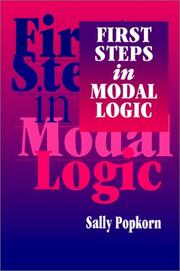
ISBN: 052146482X 9780521464826 Year: 1994 Publisher: Cambridge New York : Cambridge University Press,
Abstract | Keywords | Export | Availability | Bookmark
 Loading...
Loading...Choose an application
- Reference Manager
- EndNote
- RefWorks (Direct export to RefWorks)
This is a first course in propositional modal logic, suitable for mathematicians, computer scientists and philosophers. Emphasis is placed on semantic aspects, in the form of labelled transition structures, rather than on proof theory. The book covers all the basic material - propositional languages, semantics and correspondence results, proof systems and completeness results - as well as some topics not usually covered in a modal logic course. It is written from a mathematical standpoint. To help the reader, the material is covered in short chapters, each concentrating on one topic. These are arranged into five parts, each with a common theme. An important feature of the book is the many exercises and an extensive set of solutions is provided.
Modality (Logic). --- Modalité (Logique) --- Mathematical logic: computability theory; computational logic; lambda calculus; logic programming; mechanical theorem proving; model theory; proof theory;recursive function theory--See also {681.3*F11}; {681.3*I22}; {681.3*I23} --- Deduction and theorem proving: answer/reason extraction; reasoning; resolution; metatheory; mathematical induction; logic programming (Artificial intelligence) --- 681.3*F41 Mathematical logic: computability theory; computational logic; lambda calculus; logic programming; mechanical theorem proving; model theory; proof theory;recursive function theory--See also {681.3*F11}; {681.3*I22}; {681.3*I23} --- 681.3*I23 Deduction and theorem proving: answer/reason extraction; reasoning; resolution; metatheory; mathematical induction; logic programming (Artificial intelligence) --- Modality (Logic) --- 681.3*F41 --- 681.3*I23 --- Modal logic --- Logic --- Nonclassical mathematical logic --- Bisimulation --- Logique --- Modalité (logique) --- Modalité (Logique) --- Logique.
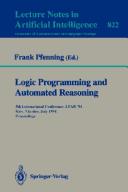
ISBN: 3540582169 0387582169 3540485732 Year: 1994 Volume: 822 Publisher: Berlin : Springer-Verlag,
Abstract | Keywords | Export | Availability | Bookmark
 Loading...
Loading...Choose an application
- Reference Manager
- EndNote
- RefWorks (Direct export to RefWorks)
This volume presents the proceedings of the 5th International Conference on Logic Programming and Automated Reasoning, held aboard the ship "Marshal Koshevoi" on the Dnieper near Kiev, Ukraine in July 1994. The LPAR conferences are held annually in the former Soviet Union and aimed at bringing together researchers interested in LP and AR. This proceedings contains the full versions of the 24 accepted papers evaluated by at least three referees ensuring a program of highest quality. The papers cover all relevant aspects of LP and AR ranging from theory to implementation and application.
681.3*D16 --- Automatic theorem proving --- -Logic programming --- -681.3*F41 --- 681.3*I23 --- Computer programming --- Automated theorem proving --- Theorem proving, Automated --- Theorem proving, Automatic --- Artificial intelligence --- Proof theory --- Computerwetenschap--?*D16 --- Congresses --- Mathematical logic: computability theory; computational logic; lambda calculus; logic programming; mechanical theorem proving; model theory; proof theory;recursive function theory--See also {681.3*F11}; {681.3*I22}; {681.3*I23} --- Deduction and theorem proving: answer/reason extraction; reasoning; resolution; metatheory; mathematical induction; logic programming (Artificial intelligence) --- 681.3*I23 Deduction and theorem proving: answer/reason extraction; reasoning; resolution; metatheory; mathematical induction; logic programming (Artificial intelligence) --- 681.3*F41 Mathematical logic: computability theory; computational logic; lambda calculus; logic programming; mechanical theorem proving; model theory; proof theory;recursive function theory--See also {681.3*F11}; {681.3*I22}; {681.3*I23} --- Logic programming --- 681.3*F41 --- Computer network architectures. --- Computer science. --- Information theory. --- Artificial intelligence. --- Computer System Implementation. --- Programming Languages, Compilers, Interpreters. --- Theory of Computation. --- Artificial Intelligence. --- Programming Techniques. --- Mathematical Logic and Formal Languages. --- AI (Artificial intelligence) --- Artificial thinking --- Electronic brains --- Intellectronics --- Intelligence, Artificial --- Intelligent machines --- Machine intelligence --- Thinking, Artificial --- Bionics --- Cognitive science --- Digital computer simulation --- Electronic data processing --- Logic machines --- Machine theory --- Self-organizing systems --- Simulation methods --- Fifth generation computers --- Neural computers --- Communication theory --- Communication --- Cybernetics --- Informatics --- Science --- Architectures, Computer network --- Network architectures, Computer --- Computer architecture
Book
ISBN: 052142027X Year: 1994 Publisher: Cambridge ; New York : Cambridge University Press,
Abstract | Keywords | Export | Availability | Bookmark
 Loading...
Loading...Choose an application
- Reference Manager
- EndNote
- RefWorks (Direct export to RefWorks)
510.6 --- Godel's theorem --- -Automatic theorem proving --- #KVIV:BB --- 681.3*F41 --- 681.3*I23 --- Automated theorem proving --- Theorem proving, Automated --- Theorem proving, Automatic --- Artificial intelligence --- Proof theory --- Gödel's incompleteness theorem --- Undecidable theories --- Arithmetic --- Completeness theorem --- Incompleteness theorems --- Logic, Symbolic and mathematical --- Number theory --- Decidability (Mathematical logic) --- Mathematical logic --- Data processing --- Mathematical logic: computability theory; computational logic; lambda calculus; logic programming; mechanical theorem proving; model theory; proof theory;recursive function theory--See also {681.3*F11}; {681.3*I22}; {681.3*I23} --- Deduction and theorem proving: answer/reason extraction; reasoning; resolution; metatheory; mathematical induction; logic programming (Artificial intelligence) --- Foundations --- 681.3*I23 Deduction and theorem proving: answer/reason extraction; reasoning; resolution; metatheory; mathematical induction; logic programming (Artificial intelligence) --- 681.3*F41 Mathematical logic: computability theory; computational logic; lambda calculus; logic programming; mechanical theorem proving; model theory; proof theory;recursive function theory--See also {681.3*F11}; {681.3*I22}; {681.3*I23} --- 510.6 Mathematical logic --- Automatic theorem proving --- Gödel's theorem --- Gödel, Kurt --- Gödel, Kurt. --- Computer programs --- Logiciels --- Verification --- Vérification --- Informatique --- Computer science --- Computer science. --- Logique mathématique --- Décidabilité (logique mathématique) --- Vérification. --- Metamathematique --- Logique mathematique --- Logique générale --- Theorie de la preuve --- Lambda-calculus
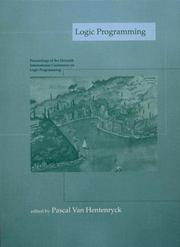
ISBN: 0262720221 9780262257145 9780262720229 0262257149 Year: 1994 Publisher: Cambridge (Mass.) MIT press
Abstract | Keywords | Export | Availability | Bookmark
 Loading...
Loading...Choose an application
- Reference Manager
- EndNote
- RefWorks (Direct export to RefWorks)
Conference proceedings presenting the state-of-the-art in Logic Programming.
Mathematical logic: computability theory; computational logic; lambda calculus; logic programming; mechanical theorem proving; model theory; proof theory;recursive function theory--See also {681.3*F11}; {681.3*I22}; {681.3*I23} --- Deduction and theorem proving: answer/reason extraction; reasoning; resolution; metatheory; mathematical induction; logic programming (Artificial intelligence) --- 681.3*I23 Deduction and theorem proving: answer/reason extraction; reasoning; resolution; metatheory; mathematical induction; logic programming (Artificial intelligence) --- 681.3*F41 Mathematical logic: computability theory; computational logic; lambda calculus; logic programming; mechanical theorem proving; model theory; proof theory;recursive function theory--See also {681.3*F11}; {681.3*I22}; {681.3*I23} --- 681.3*D3 --- 681.3*F3 --- 681.3*F41 --- 681.3*I23 --- 681.3*I25 --- 681.3*F3 Logics and meanings of programs (Theory of computation) --- Logics and meanings of programs (Theory of computation) --- 681.3*D3 Programming languages --- Programming languages --- 681.3*I25 Programming languages and software: expert system tools and techniques (Artificial intelligence)--See also {681.3*D32} --- Programming languages and software: expert system tools and techniques (Artificial intelligence)--See also {681.3*D32} --- Logic Programming --- Logic programming --- Programmation logique --- Congresses --- Congrès --- COMPUTER SCIENCE/Artificial Intelligence
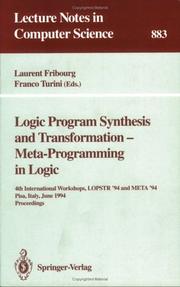
ISBN: 3540587926 Year: 1994 Volume: 883 Publisher: Berlin : Springer-Verlag,
Abstract | Keywords | Export | Availability | Bookmark
 Loading...
Loading...Choose an application
- Reference Manager
- EndNote
- RefWorks (Direct export to RefWorks)
Logic programming --- -681.3*D34 --- 681.3*F32 --- 681.3*F41 --- 681.3*I22 --- 681.3*I24 --- Computer programming --- Congresses --- Processors: code generation; compilers; interpreters; optimization; parsing; preprocessors; run-time environments; translator writing systems and compilergenerators (Programming languages) --- Semantics of programming languages: algebraic approaches to semantics; denotational semantics; operational semantics (Logics and meanings of programs)--See also {681.3*D31} --- Mathematical logic: computability theory; computational logic; lambda calculus; logic programming; mechanical theorem proving; model theory; proof theory;recursive function theory--See also {681.3*F11}; {681.3*I22}; {681.3*I23} --- Automatic programming: automatic analysis of algorithms; program modification; program synthesis; program transformation; program verification (Artificialintelligence)--See also {681.3*D12}; {681.3*F31} --- Knowledge representation formalisms and methods: frames and scripts; predicate logic; relation systems; representation languages; procedural and rule-based representations; semantic networks (Artificial intelligence) --- 681.3*I24 Knowledge representation formalisms and methods: frames and scripts; predicate logic; relation systems; representation languages; procedural and rule-based representations; semantic networks (Artificial intelligence) --- 681.3*I22 Automatic programming: automatic analysis of algorithms; program modification; program synthesis; program transformation; program verification (Artificialintelligence)--See also {681.3*D12}; {681.3*F31} --- 681.3*F41 Mathematical logic: computability theory; computational logic; lambda calculus; logic programming; mechanical theorem proving; model theory; proof theory;recursive function theory--See also {681.3*F11}; {681.3*I22}; {681.3*I23} --- 681.3*F32 Semantics of programming languages: algebraic approaches to semantics; denotational semantics; operational semantics (Logics and meanings of programs)--See also {681.3*D31} --- 681.3*D34 Processors: code generation; compilers; interpreters; optimization; parsing; preprocessors; run-time environments; translator writing systems and compilergenerators (Programming languages) --- 681.3*D34
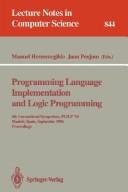
ISBN: 3540584021 354048695X Year: 1994 Publisher: Berlin : Springer-Verlag,
Abstract | Keywords | Export | Availability | Bookmark
 Loading...
Loading...Choose an application
- Reference Manager
- EndNote
- RefWorks (Direct export to RefWorks)
This volume constitutes the proceedings of the 6th International Symposium on Programming Language Implementation and Logic Programming (PLILP '94), held in Madrid, Spain in September 1994. The volume contains 27 full research papers selected from 67 submissions as well as abstracts of full versions of 3 invited talks by renowned researchers and abstracts of 11 system demonstrations and poster presentations. Among the topics covered are parallelism and concurrency; implementation techniques; partial evaluation, synthesis, and language issues; constraint programming; meta-programming and program transformation; functional-logic programming; and program analysis and abstract interpretation.
Programming languages (Electronic computers) --- -Logic programming --- -681.3*D31 --- 681.3*D34 --- 681.3*F33 --- 681.3*F41 --- 681.3*F42 --- Computer programming --- Congresses --- Formal definitions and theory: semantics; syntax (Programming languages)--See also {681.3*D21}; {681.3*F31}; {681.3*F32}; {681.3*F42}; {681.3*F43} --- Processors: code generation; compilers; interpreters; optimization; parsing; preprocessors; run-time environments; translator writing systems and compilergenerators (Programming languages) --- Studies of program constructs: control primitives; functional constructs; program and recursion schemes; type structure (Logics and meanings of programs)-- See also {681.3*D32}; {681.3*D33} --- Mathematical logic: computability theory; computational logic; lambda calculus; logic programming; mechanical theorem proving; model theory; proof theory;recursive function theory--See also {681.3*F11}; {681.3*I22}; {681.3*I23} --- Grammars and other rewriting systems: decision problems; grammar types; parallel rewriting systems; parsing; thue systems (Mathematical logic and formal languages)--See also {681.3*D31} --- 681.3*F42 Grammars and other rewriting systems: decision problems; grammar types; parallel rewriting systems; parsing; thue systems (Mathematical logic and formal languages)--See also {681.3*D31} --- 681.3*F41 Mathematical logic: computability theory; computational logic; lambda calculus; logic programming; mechanical theorem proving; model theory; proof theory;recursive function theory--See also {681.3*F11}; {681.3*I22}; {681.3*I23} --- 681.3*F33 Studies of program constructs: control primitives; functional constructs; program and recursion schemes; type structure (Logics and meanings of programs)-- See also {681.3*D32}; {681.3*D33} --- 681.3*D34 Processors: code generation; compilers; interpreters; optimization; parsing; preprocessors; run-time environments; translator writing systems and compilergenerators (Programming languages) --- 681.3*D31 Formal definitions and theory: semantics; syntax (Programming languages)--See also {681.3*D21}; {681.3*F31}; {681.3*F32}; {681.3*F42}; {681.3*F43} --- 681.3*D31 --- Logic programming --- Computer science. --- Logic design. --- Artificial intelligence. --- Programming Languages, Compilers, Interpreters. --- Logics and Meanings of Programs. --- Programming Techniques. --- Mathematical Logic and Formal Languages. --- Artificial Intelligence. --- AI (Artificial intelligence) --- Artificial thinking --- Electronic brains --- Intellectronics --- Intelligence, Artificial --- Intelligent machines --- Machine intelligence --- Thinking, Artificial --- Bionics --- Cognitive science --- Digital computer simulation --- Electronic data processing --- Logic machines --- Machine theory --- Self-organizing systems --- Simulation methods --- Fifth generation computers --- Neural computers --- Design, Logic --- Design of logic systems --- Digital electronics --- Electronic circuit design --- Logic circuits --- Switching theory --- Informatics --- Science --- Langages de programmation
| Listing 1 - 10 of 10 |
Sort by
|

 Search
Search Feedback
Feedback About
About Help
Help News
News